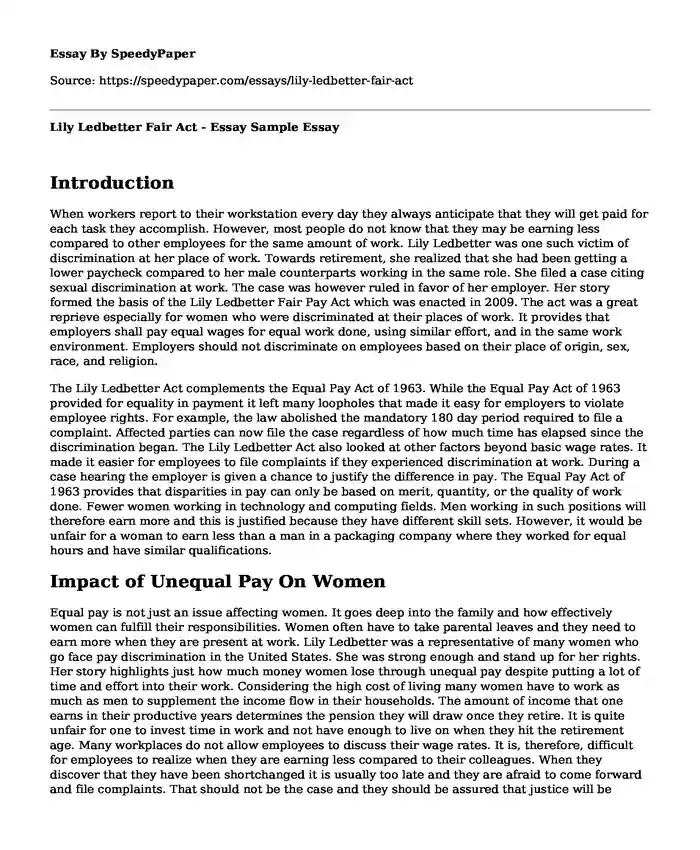Introduction
When workers report to their workstation every day they always anticipate that they will get paid for each task they accomplish. However, most people do not know that they may be earning less compared to other employees for the same amount of work. Lily Ledbetter was one such victim of discrimination at her place of work. Towards retirement, she realized that she had been getting a lower paycheck compared to her male counterparts working in the same role. She filed a case citing sexual discrimination at work. The case was however ruled in favor of her employer. Her story formed the basis of the Lily Ledbetter Fair Pay Act which was enacted in 2009. The act was a great reprieve especially for women who were discriminated at their places of work. It provides that employers shall pay equal wages for equal work done, using similar effort, and in the same work environment. Employers should not discriminate on employees based on their place of origin, sex, race, and religion.
The Lily Ledbetter Act complements the Equal Pay Act of 1963. While the Equal Pay Act of 1963 provided for equality in payment it left many loopholes that made it easy for employers to violate employee rights. For example, the law abolished the mandatory 180 day period required to file a complaint. Affected parties can now file the case regardless of how much time has elapsed since the discrimination began. The Lily Ledbetter Act also looked at other factors beyond basic wage rates. It made it easier for employees to file complaints if they experienced discrimination at work. During a case hearing the employer is given a chance to justify the difference in pay. The Equal Pay Act of 1963 provides that disparities in pay can only be based on merit, quantity, or the quality of work done. Fewer women working in technology and computing fields. Men working in such positions will therefore earn more and this is justified because they have different skill sets. However, it would be unfair for a woman to earn less than a man in a packaging company where they worked for equal hours and have similar qualifications.
Impact of Unequal Pay On Women
Equal pay is not just an issue affecting women. It goes deep into the family and how effectively women can fulfill their responsibilities. Women often have to take parental leaves and they need to earn more when they are present at work. Lily Ledbetter was a representative of many women who go face pay discrimination in the United States. She was strong enough and stand up for her rights. Her story highlights just how much money women lose through unequal pay despite putting a lot of time and effort into their work. Considering the high cost of living many women have to work as much as men to supplement the income flow in their households. The amount of income that one earns in their productive years determines the pension they will draw once they retire. It is quite unfair for one to invest time in work and not have enough to live on when they hit the retirement age. Many workplaces do not allow employees to discuss their wage rates. It is, therefore, difficult for employees to realize when they are earning less compared to their colleagues. When they discover that they have been shortchanged it is usually too late and they are afraid to come forward and file complaints. That should not be the case and they should be assured that justice will be served and they will get compensation.
Conclusion
Despite the existing laws that shield employees from discrimination at work wage equality has not yet been achieved for all. Discrimination in wage rates can only be solved when there are clearly defined policies. Before signing up for a job the employee should research to determine how much they should earn from the job. Employees may also tend to be less productive if they realize that they are getting lower salaries. Unfair remuneration to employees affects not just their current financial status but also the amount of money they will draw after retirement. Employers should therefore put in place measures to act per equality laws.
References
The United States Equal Employment Opportunity Commission. (2016). Equal Pay Act of 1963 and the Lily Ledbetter Fair Pay Act of 2009.
Cite this page
Lily Ledbetter Fair Act - Essay Sample. (2023, Dec 30). Retrieved from https://speedypaper.net/essays/lily-ledbetter-fair-act
Request Removal
If you are the original author of this essay and no longer wish to have it published on the SpeedyPaper website, please click below to request its removal:
- Free Essay on Marijuana Policy Project
- Capital Budgeting Essay Sample for Free
- Capital Budgeting Case Study, Free Paper Example
- Free Essay on Apple Pay - Trend Analysis
- Subject: Briefing Paper to the Minister on Tax and Pensions
- Free Essay. International Trade Theories
- Modern Day Currency - Free Essay Sample
Popular categories





